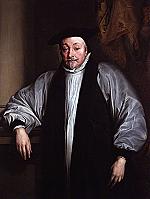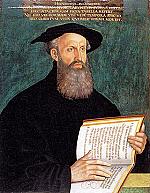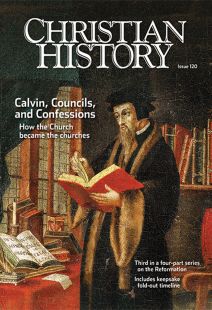Pastor of Geneva
CALVIN was pushed into becoming a pastor one fine day in 1536 by Guillaume Farel. Why did Farel take an interest in this 27-year-old lawyer, humanist, and self-taught theologian? Because for some months, the cultured public could speak of nothing other than Calvin’s Christianae religionis institutio (1536), what we call in English the Institutes.
That first stay in Geneva ended unfortunately; the government drove Calvin and Farel out at Easter 1538. Calvin went to Strasbourg, where Martin Bucer asked him to take care of a community of French-speaking Protestant refugees and to teach at the Strasbourg academy. There he acquired experience in the pastoral ministry, the catechism, and the liturgy.
Order Christian History #120: Calvin, Councils, and Confessions in print.
Subscribe now to get future print issues in your mailbox (donation requested but not required).
During his exile, the situation in Geneva bordered on anarchy; in 1540, an official delegation begged Calvin to come back. Reluctantly, he and his new wife, Idelette, returned to Geneva in September 1541, intending to spend a few months, just enough time to put the affairs of the church in order.
Soon the government adopted Calvin’s Ecclesiastical Ordinances. In the city’s three churches, preaching sounded forth every day of the week (twice on Sunday) with sermons lasting for more than an hour. Eighteen pastors from Geneva and surrounding parishes formed a high-caliber “Pastors Company” that wielded considerable influence.
Calvin and fellow pastors administered baptism and Communion; presided over marriages (which took place during ordinary services); and managed public charity. They participated with church elders in the meetings of the renowned Consistory, which gathered every Thursday to censure, even excommunicate, believers guilty of offenses against Reformed morality or doctrine.
Calvin also provided pastors with The Catechism of the Church of Geneva (1542). It enabled pastors to teach the basics of the Reformed faith by means of questions and answers. Memorized by children at school, repeated and explained before the whole community on Sunday, it became a key element in the formation of the faith of Reformed believers for nearly two centuries. The same year, Calvin composed a liturgy, the Form of Church Prayers and Hymns, and introduced the public singing of the Psalms. The Psalter became the heart of Reformed piety.
Exhausted by illness, Calvin passed away May 27, 1564. He died as poor as he had lived, without any other title than that of pastor.
This article is from Christian History magazine #120 Calvin, Councils, and Confessions. Read it in context here!
Christian History’s 2015–2017 four-part Reformation series is available as a four-pack. This set includes issue #115 Luther Leads the Way; issue #118 The People’s Reformation; issue #120 Calvin, Councils, and Confessions; and issue#122 The Catholic Reformation. Get your set today. These also make good gifts.
By Olivier Fatio
[Christian History originally published this article in Christian History Issue #120 in 2016]
Dr. Olivier Fatio, professor of the history of Christianity at the University of Geneva and founder of the International Museum of the Reformation. This article is adapted from CH 12.Next articles
God our only comfort: German confessions
Excerpts from the Book of Concord and the Heidelberg Confession
variousThe rest of the story
The Reformation in England and Scotland took two very different paths
Calvin LaneThe king, the emperor, and the theologians
The men who promoted and disputed reform in France, Germany, Switzerland, and Spain
David C. Steinmetz, Paul Thigpen, and the editorsSupport us
Christian History Institute (CHI) is a non-profit Pennsylvania corporation founded in 1982. Your donations support the continuation of this ministry
Donate







